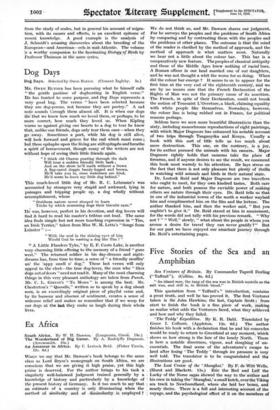Dog Days
Dog Days. Selected by Owen Rutter. (Clement Ingleby. 5s.) Ma. OWEN Rtyrrun has been pursuing what he himself calls "the gentle pastime of - doghunting in English verse." He has hunted to some purpose, and Dog Days represents a vety good bag. The verses "have been selected because
they are dog-poems, not because they .are poetry." A sad note sounds through them almost all. It is when our dogs die that we know how much we loved them, or perhaps, to be more correct, how much they loved us. When Kipling warns us against giving our hearts to a dog to tear he knew that, unlike our friends, dogs only tear them once—when they go; away. Sometimes a poet, while his dog is still alive, will look forward and grieve for the end which must 'come; but these epitaphs upon the living are still epitaphs and breathe a spirit of bereavement, though many of the writers are not without hope of seeing their little friends again.
"I think oldCharon punting through the dark Will hear a sudden friendly little bark ; And on the shore he'll mark without a frown A flap-eared doggie bandy-legged and brown. He'll take you in, since waterruen are kind, He'd scorn to leave my little dog behind."
This much-loved little dog of Mr. R. C. Lehmann's was accounted by strangers very stupid and awkward, lying in paksages and tripping people up, a dog wholly without accomplislunenti whose "Stubborn nature never stooped to learn Tricks by which muniming dogs their biscuits earn."
He was, however, perfect in his devotion, and dog lovers will find it hard to read his master's tribtue out lond. The same idea finds simple but not more -touching expression in "Tim, anIrish Terrier," taken from Miss W. M. Letts's "Songs from
Leinster " :—
" With the soul in the shining eyes of him Would God be wasting a dog like Tim ? "
C.' A Little Flanders Tyke," by E. F. Coote Lake, is another very charming little offering to the memory of a friend "gone west." The returned soldier in his day-dreams and night- dreams has, from time to time, a sense of" a friendly snufflin' an' the 'appy smell o' dog:: These last verses will only
appeal to the elect—the true dog-lover, the man who "likes dogs out of doors " need not read it. Many of the most charming things in this very pleasant anthology are taken from Punch.
Mr. C. L. Graves's "To Moses" is among the best.- Mr. Chesterton's " Quoodle," written so to speak by a dog about men, is an exceedingly original piece of playful verse and, by its humour and absence of sentiment, creates a sense of welcome relief and makes us rethember that if we weep for
our dogs at the last they make us laugh during their whole lives.






















































 Previous page
Previous page